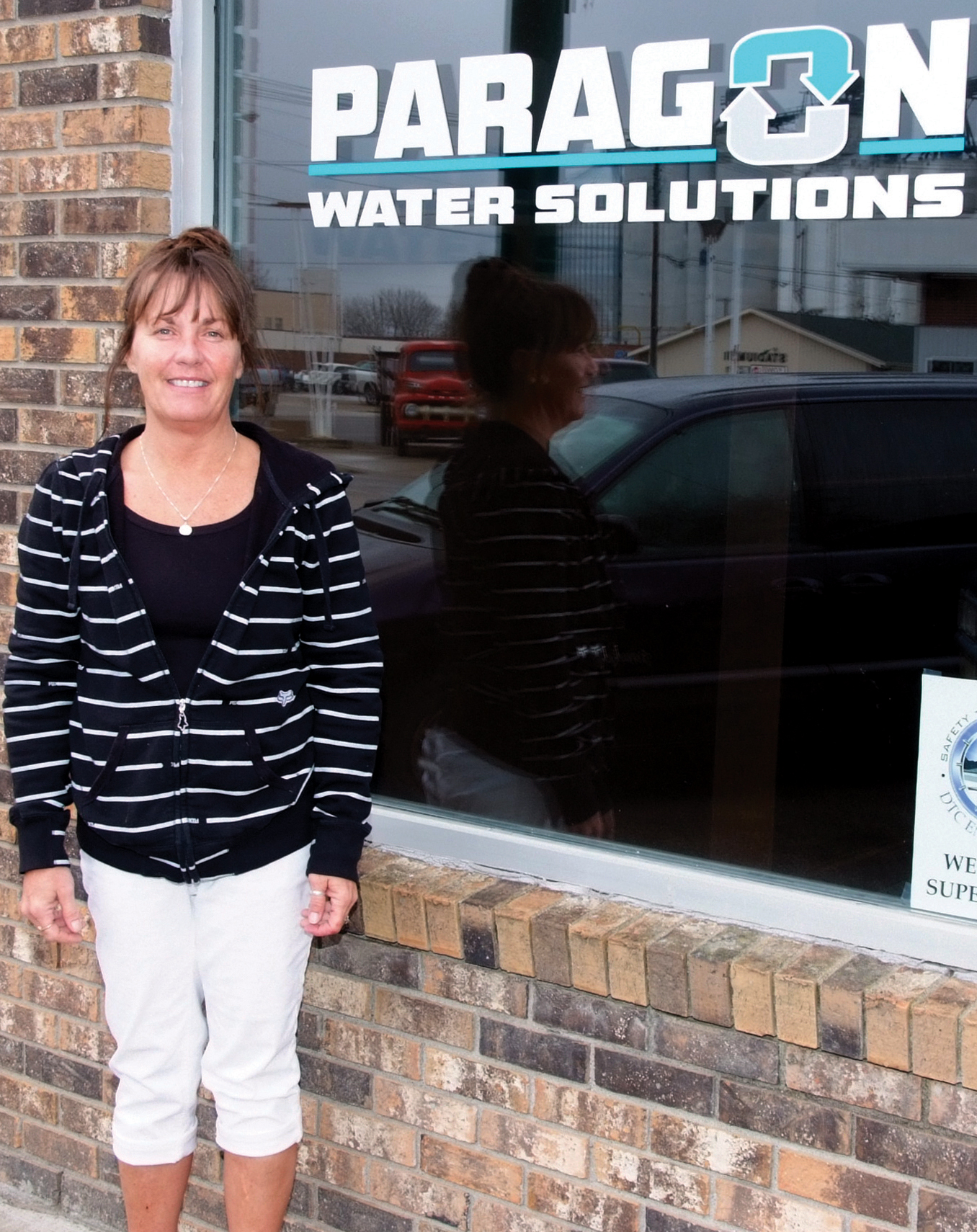News
Caring for the environment
Scott Wagar
04/24/2012

For those individuals who drive down Main Street and have seen the new business, Paragon Water Solutions, and wonder what type of business it is, well, it is a water purification company that is presently playing a major role in the Bakken oil field.
“We are an oil service company that offers our services to rigs who need their fracking water cleaned which is used for oil drilling,” said Angie (Crooks) Bercier, co-owner of Paragon, who was born and raised in Bottineau, and is a 1984 graduate of Bottineau High School and an alumni of Dakota College at Bottineau. “After we clean the water, it is either disposed of in an environmentally safe way at a low cost to the oil companies, or, re-used at the rig site.”
Angie and her husband, Dale, established Paragon last February with the idea of creating a company that could eliminate unclean fracking water in the state of North Dakota, making their home state a safer and cleaner environment to live in.
“I was adamant about not using reserve pits and placed a bug in my husband’s ear, who works in the oil industry, about recycling wastewater, which then could be reused or disposed of properly,” Bercier said. “By doing so, we could eliminate the reserve pit on drilling sites.”
Reserve pits are enclosed, but open top trenches where water is stored after being used to drill for oil. The pits are considered to be a possible hazard to the environment.
With that in mind, Angie and Dale started looking for what they called the “magic bullet” in purifying wastewater. While searching for an answer, the Berciers attended a concrete conference in Las Vegas where they found the perfect solution to their water idea.
“We ran into a company out there called ALAR Engineering, an auto-vac company out of Chicago, Ill., which specializes in cleaning water,” she said. “ALAR built us a pilot water-vac program machine, which worked perfectly for what we were looking for in getting our goals accomplished.”
Bercier’s initial idea was to have a stationary machine in different parts of the state where wastewater could be purified, but ALAR created a mobile unit which could be transported directly to the oil rig sites, and then moved on to the next site.
“We were impressed with ALAR’s idea, because the mobile unit was so much better for a number of reasons” Bercier said. “The mobile unit can contain the water onsite, which in turn slows down traffic on roads that are already considered dangerous with so many trucks using the roads out there. The water from Paragon is stored in tanks and is much more affordable than the conventional ways they are currently using.”
Oil companies, which want to dispose of the wastewater after it’s clean, can do so by hauling it to a disposal site at a more reasonable price. Those companies which want to reuse the water, they are also saving money by reprocessing Paragon’s water at the oil rig sites.
“My husband used the same water at a rig site last year for three months,” Bercier said. “This is great because it saves oil companies and the state in these ways (money and water).”
To understand the complexity of the water that is used in fracking, what the byproducts are of the drilling operation, and how conventional water purification methods (filtration, centrifuge, settling tanks, etc…) compare to Paragon, Bercier stated the following facts:
- It takes four million gallons of water for each fracking well.
- There is no versatility with brine, fresh water and oils.
- There are inefficient results, which includes bottle necks and filter blinded.
- Poor water quality and nominal filtration.
- Wet tonnage and sludge hauling is expensive.
- Pits are unsightly and a possible environmental liability.
- There is centrifuge bearing replacement and maintenance.
- Labor intensive.
Paragon and ALAR’s mobile units also produce an environmentally safe dry solid, which they are attempting to utilize.
“There is some consideration taking place that the dry solids we produce could possibly be used in making roads and also being used for other industrial uses, because it is a clean, safe solid byproduct,” Bercier said.
When it comes to reserve pits, the state of North Dakota passed the HF regulation (pit requirements and hydraulic fracturing regulation), which is to eliminate reserve pits in the state, which was supposed to take effect on April 1.
However, the new regulation has not gone into effect yet due to legal counsel and the pits are continuing to be used in North Dakota.
Although reserve pits are still in operations in North Dakota, the Berciers’ company is catching on in the Williston Basin.
“We started out with 16 employees last fall and one purification unit,” Bercier said. “Now, we have 25 employees and two units working out west in the oil fields.”
When Paragon is onsite, it takes two to three individuals to operate a mobile unit. The company work seven days a week, 24 hours a day, in 12 hour shifts.
Besides offering the service of waste water purification in the oil fields, the company also has two subsidiary companies, which include a drug testing company for oil field employees and a roustabout company where Paragon assists in providing oil workers for companies who need extra men for jobs.
Bercier stated that she is pleased to be part of Paragon.
“We are excited to bring safer water to the state and the environment through our company,” she said. “As well as bringing Paragon into my hometown community, creating jobs here and being part of a community my husband and I really love and enjoy.”
